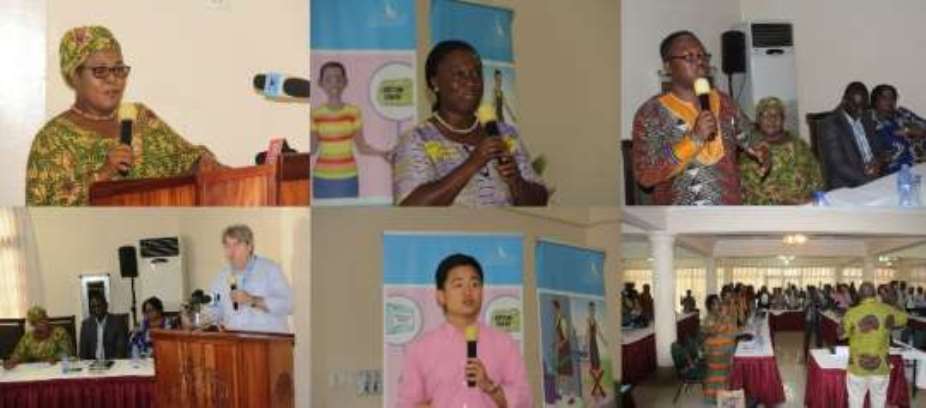The Ghana Education Service (GES) in collaboration with UNICEF has launched a Menstrual Hygiene Management (MHM) communication materials and website to educate pupils, especially girls on menstrual hygiene.
The communication materials being disseminated to stakeholders as well as 32,000 basic and 1,000 second cycle schools in the country seeks to help keep the pupils and students abreast and also build their confidence level when they are in their monthly flow.
The website: www.menstrualhygienegh.org would also help provide information on MHM to pupils and students in distant communities.
Mrs Margaret Okai, the Director Basic Education Division, GES, speaking at the event, said MHM is an emerging global concern, not only with regards to the menstrual period, but the need to address societal beliefs and taboos surrounding the issue.
She said menstruation was a normal biological process and a key sign of reproductive health, yet in many cultures it was treated as something negative, shameful or dirty.
Mrs Okai said in 2014, Ghana was selected among fourteen other countries to participate in a research on advocacy and capacity building for MHM through Water, Sanitation and Hygiene (WASH) in schools.
Based on the findings and recommendations of the study, she said, Behaviour Change Communication (BCC) materials in a form of basic package to help change the perception of people as far as MHM was concerned was developed.
Mrs Okai said the communication materials being developed and designed as basic MHM guide include; flipchart for boys and girls, flipchart for girls, flash cards, posters, teaching manuals, booklets and brochures targeted at educating pupils and students, teachers and community members to have sustained positive behaviours towards MHM.
She said these materials are important as it would communicate strong and lasting messages about MHM, promote ownership of the message and positive attitudes to behaviors being advocated through the messages, promote knowledge about and appreciation of the various MHM materials and their uses among others.
Mrs Okai urged stakeholders to own the MHM materials and support the education process.
Dr Edward Nanbigne, Lecturer Institute of African Studies, University of Ghana, said a study conducted in Zabzugu and North Dayi districts revealed that in some communities menstruating girls are relieved of their normal routines and may be isolated or confined.
He said to worsen the situation, the lack of support in schools such as changing rooms, toilets, running water, and supply of sanitary pads, among others leads the girl stay at home during menstruation.
Dr Nanbigne said the experiences of girls in these districts made it possible to understand the situation with regard to MHM issues.
He said the impartation of knowledge on menstruation should factor in the local contexts of taboos, myths and prohibitions so that girls would understand how to cope in the face of these restrictions.
He said Parent Teachers Association Meetings (PTA) and other fora with traditional authorities should address some of these challenges that girls face as a result of these taboos to save the situation.
Mr David Duncan, Chief of WASH, UNICEF, pledged their support to the Government of Ghana to ensure that they achieve change with regard to MHM.
He said there is the need to advocate for a more cost effective gender friendly facilities to improve MHM in schools.
Mr Duncan urged stakeholders to build on efforts being made to move forward with effective collaboration, adding 'engage everyone to have a genuine result and to enable them be part of the process.'
Mr Hyung Joon Kim, a UNICEF representative, also added that communication materials have been developed to ensure that at the end of the campaign girls would be confident, healthy, bold, friendly, clean, fine, and be amazing during their menstruation.
'This will allow all to participate and create a conducive environment for girls to talk about menstruation and thereby influence behaviour change,' he said.
GNA
By Samira Larbie/William Fiabu, GNA





 We’ll protect state wealth from opaque deals – Prof Jane Naana
We’ll protect state wealth from opaque deals – Prof Jane Naana
 Mauritania president says running for second term in June polls
Mauritania president says running for second term in June polls
 I won't ever say I was a mere driver’s mate' — Prof. Opoku-Agyemang
I won't ever say I was a mere driver’s mate' — Prof. Opoku-Agyemang
 2024 polls: 'EC struggling to defend credibility'— Prof. Opoku-Agyemang
2024 polls: 'EC struggling to defend credibility'— Prof. Opoku-Agyemang
 Akufo-Addo gov't's 'greed, unbridled arrogance, unrestrained impunity, sheer dis...
Akufo-Addo gov't's 'greed, unbridled arrogance, unrestrained impunity, sheer dis...
 Election 2024: Ghana needs an urgent reset, a leadership that is inspiring – Ma...
Election 2024: Ghana needs an urgent reset, a leadership that is inspiring – Ma...
 Partner NDC to rollout a future of limitless prospects – Prof Jane Naana Opoku-A...
Partner NDC to rollout a future of limitless prospects – Prof Jane Naana Opoku-A...
 NPP will remain in gov’t till Jesus comes — Diana Asamoah
NPP will remain in gov’t till Jesus comes — Diana Asamoah
 Sunyani Technical University demands apology from former SRC president over sex-...
Sunyani Technical University demands apology from former SRC president over sex-...
 'Dumsor' was resolved by Mahama but ‘incompetent' Akufo-Addo has destroyed the g...
'Dumsor' was resolved by Mahama but ‘incompetent' Akufo-Addo has destroyed the g...
